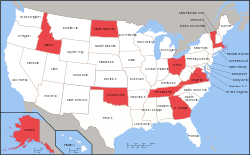1984: Beginnings of Super Tuesday
The 1984 primary season had three "Super Tuesdays". [3] Decided on "Super Tuesday III" were delegates from five states: South Dakota, New Mexico, West Virginia, California and New Jersey. [4] The proportional nature of delegate selection meant that Walter Mondale was likely to obtain enough delegates on that day to win the nomination at the 1984 Democratic National Convention, no matter who actually won the states contested. Gary Hart maintained that unpledged superdelegates that had previously announced support for Mondale would shift to his side if he swept the Super Tuesday III primary. [5]
Hart committed a faux pas, insulting New Jersey shortly before the primary day. Campaigning in California, he remarked that while the "bad news" was that he and his wife Lee had to campaign separately, "[t]he good news for her is that she campaigns in California while I campaign in New Jersey." When his wife interjected that she "got to hold a koala bear", Hart replied that "I won't tell you what I got to hold: samples from a toxic waste dump." [5] While Hart won California, he lost New Jersey despite having led in polls by as much as 15 points.
Mondale secured the majority of delegates from the primaries, leading the way for him to take the Democratic presidential nomination. [3] In the 1984 Republican Party primaries, incumbent President Ronald Reagan was the only candidate to secure delegates. [6]
1988: Southern states primary
Proposals for holding the presidential primaries of southern states at once started in the 1970s in order to maintain and increase the region's influence in presidential elections. It would allow for a conservative favorite son candidate from the south to receive a lead in delegate totals and produce momentum for the other primaries. Other southern presidential candidates had fared poorly in the initial contests in Iowa and New Hampshire which allowed more liberal candidates to gain the nomination. [7]
Alabama, Florida, and Georgia designated the second Tuesday of March as the date for their presidential primaries and the Southern Legislative Conference lobbied other states to join. 864 Democratic and 564 Republican delegates came from the southern states in the 1988 primary. [7] Frank Fahrenkopf, chair of the Republican National Committee, stated that "Southern Democrats intended Super Tuesday to be a way to moderate their party", but that "the Democrats have handed us a tremendous opportunity to win over the disaffected majority of their party". [8]
Southern politicians formed the Democratic Leadership Council and hoped to have Governor Chuck Robb or Senator Sam Nunn seek the presidential nomination, but both declined. Michael Dukakis, Dick Gephardt, Al Gore and Jesse Jackson campaigned in the Super Tuesday states. Gephardt and Gore were both southerners, Jackson sought the high percentage of black voters in the region, and Dukakis focused on Texas and Florida where he could receive the support of Hispanic and northerners. [9] Jackson won a plurality of the southern delegates with 286 followed by Gore's 259. Seventy percent of Dukakis' 193 delegates from the south came from Florida and Texas, the only southern states he won. [10]
Four hundred and fifty one delegates were selected in the Democratic primary before Super Tuesday. Dukakis held 14.2% of the delegates, Gephardt held 10.4%, Jackson held 6.2%, Gore held 3.8%, and the remaining candidates or uncommitted were 65.4%. After Super Tuesday Dukakis held 27.8% of the 1,638 delegates selected so far, Jackson held 24.2%, Gore held 21.2%, Gephardt held 8.7%, and the remaining candidates and uncommitted held 18.1%.
One hundred and seventy four delegates were selected in the Republican primary before Super Tuesday. George H. W. Bush held 35.1% of these delegates, Bob Dole 34.5%, Kemp 20.1%, and the other candidates 10.4%. After Super Tuesday Bush held 73.5% of the 959 delegates selected so far with Dole holding 17%, Kemp 4.1%, and the remaining candidates 5.4%. Bush's victory in all but one state on Super Tuesday nearly secured him enough delegates to win the Republican presidential nomination. Bush won a majority of the vote in all southern states except for in three states, and received 85.7% of their delegates due to the primaries being winner-take-all. [12] Pat Robertson's campaign was weakened following a defeat in South Carolina and Super Tuesday.
Dukakis and Gore spent $3 million on the Super Tuesday states while Gephardt spent $1.5 million. Jackson was critical of the expensive requirements of running a campaign in all of the states. His campaign spent $447,644 in total for Super Tuesday, but Jackson noted how adequate advertising time in a single station in Dallas for a week would cost around $300,000.
The Southern Legislative Conference reported that in the eight months prior to Super Tuesday, the four Democratic candidates spent an average of 75 days in the south, while the three Republican candidates spent an average of 51 days. Gore spent 121 days in the south. Jackson was the only candidate that spent more time in the south than in Iowa and New Hampshire. [15]
From 1996 to 2004, most of the Southern primaries were held the week after Super Tuesday, on a day dubbed "Southern Tuesday" by news commentators. [16] [17] [18]













